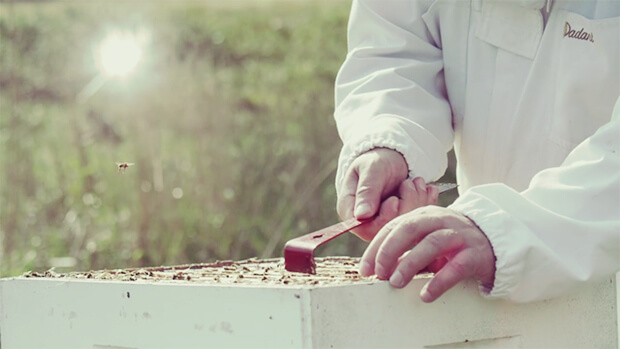- January 27, 2015
- By Karen Shih ’09
Imagine your blueberries missing from the cereal bowl. Those almonds you keep as an afternoon pick-me-up gone. A third of your dinner plate empty.
That’s the future entomology Assistant Professor Dennis vanEngelsdorp is fighting to prevent—and now, he and his dedication to saving the honey bees are the subject of a new short film premiering at the Sundance Film Festival in Utah (Jan. 22–Feb. 1).
“He’s so unbelievably knowledgeable and passionate,” says Director Steven Cantor. “We were right up close, a foot away from 10,000 bees swarming all around us. But Dennis was so calm and confident around them, and that energy pervaded the whole set. Nobody was nervous.”
The film is one of a 10-part series called “The Collectors,” created by FiveThirtyEight, Nate Silver’s data-driven journalism site owned by ESPN. (Sociology Professor Dana Fisher is the subject of another documentary in the series.) The vanEngelsdorp film, called “The Beekeeper,” was one of 60 selected for the festival out of more than 8,000 submissions.
“It’s great to bring this kind of attention to honey bees,” says lab manager Heather Eversole, who was part of the team that Cantor and his crew filmed over two days in October. “We don’t see our work as glamorous, but they took an artistic approach to it.”

Honey bees are directly or indirectly responsible for one out of every three bites we take, says vanEngelsdorp, since they pollinate everything from melons and apples to broccoli and celery (they help vegetables produce seeds). The honey bee population has been declining over the last half-century as a result of a number of factors, including urbanization, increased pesticide use and changes in farming (increased corn production, for example, doesn’t provide food for bees) and earlier hay harvests that prevent clover—a honey bee favorite—from flowering. Since the 1980s, Varroa mites, parasites that suck the honey bees’ blood, have caused major die-offs as well.
“We need to get the message out there that bees are critical for our food supply,” vanEngelsdorp says. “It’s one everyone needs to hear.”
He helped create the Bee Informed Partnership with colleagues across the country nearly a decade ago to gather comprehensive data on the U.S. honey bee population. The group surveys commercial and backyard beekeepers about the insects’ health and the ways they maintain or grow their colonies.
Bee Informed will conduct its annual survey in April and May, and it has started a new “sentinel hives” project, which equips hives with a scale to monitor colony growth through weight gain or loss, as well as a trap to collect pollen samples. This real-time information will help researchers advise beekeepers on when to treat for disease or harvest honey.
VanEngelsdorp hopes the film can help people “make constructive decisions in their own environments to help pollinators.” These include planting meadows with flowering plants, instead of a grass lawn; not using pesticides; supporting beekeepers by buying local honey; and becoming a beekeeper. Maryland will offer its first two-day beginning beekeeping class, open to the public, March 28-29.
Watch “The Beekeeper” at FiveThirtyEight.com.
Tags
Research